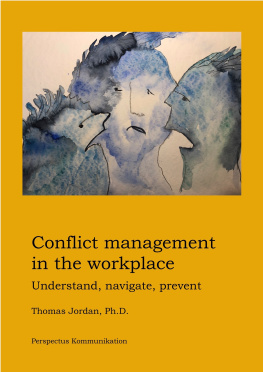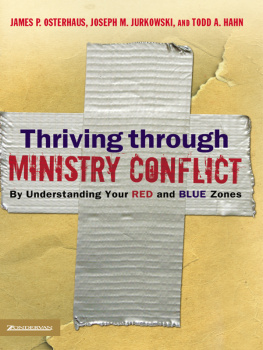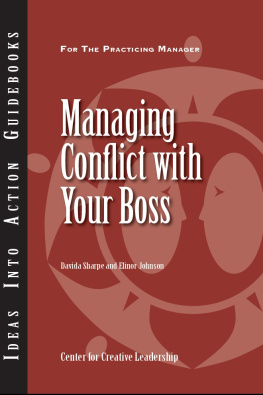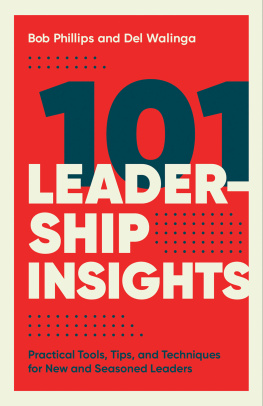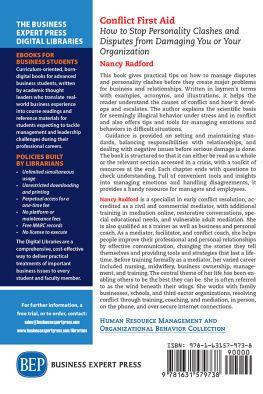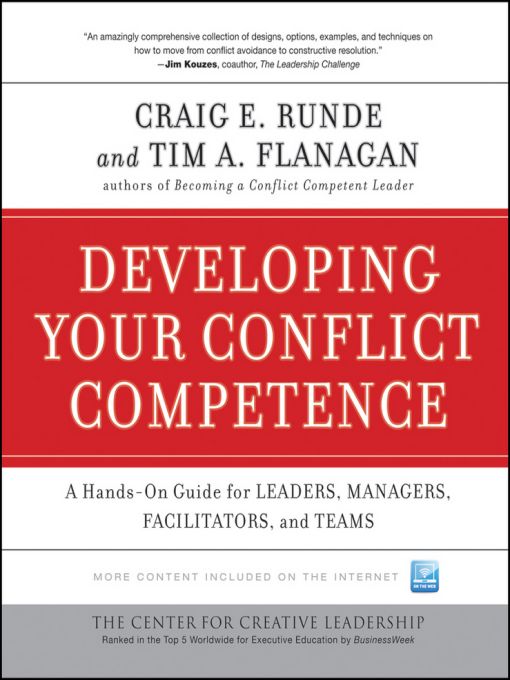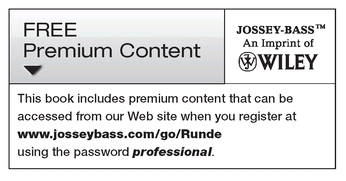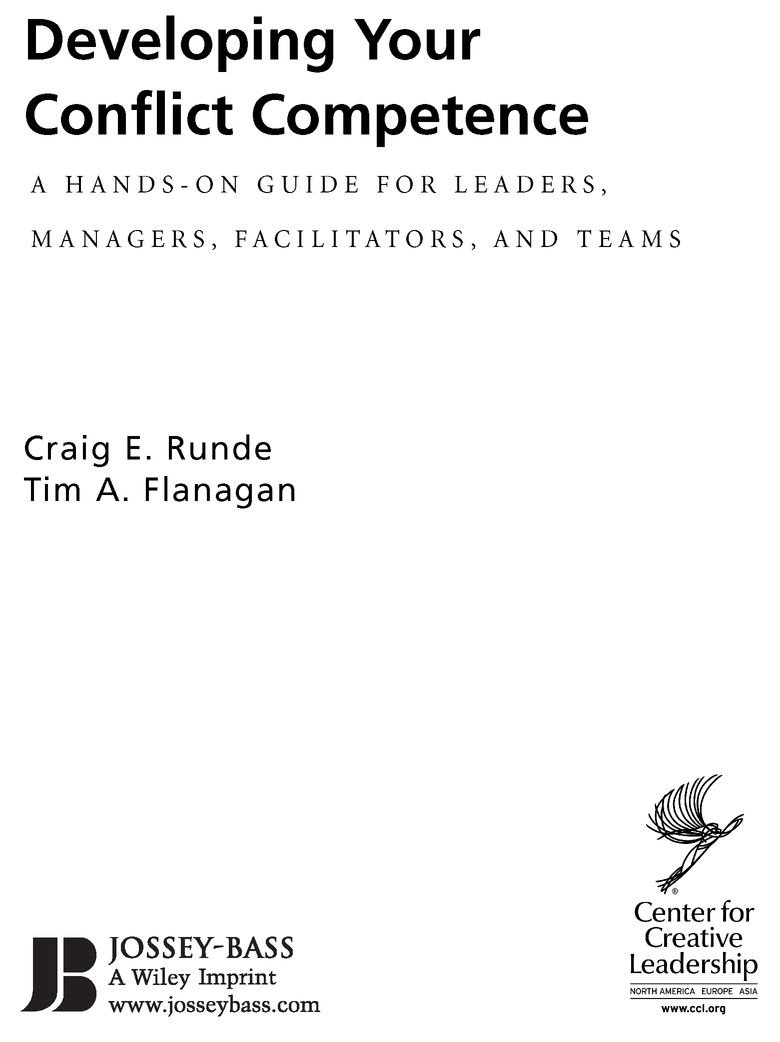Table of Contents
On the Web: Take the Conflict Dynamics Profile With a 1/2 Hour Review Session at a Substantial Discount
The Conflict Dynamics Profile assessment instrument helps you better understand how you currently respond to workplace conflict. It enables you to leverage areas of strength and modify behaviors that dont work well. The instrument provides specific measures on fifteen different constructive and destructive behaviors. It also looks at conflict hot buttonssituations and behaviors in others that can irritate you and trigger conflict.
In addition to an eight-page report and forty-page development guide, you will also receive a half-hour telephone session with an experienced consultant who will review your results with you.
Link: www.conflictdynamics.org/special
Code word for discount: CCD3
Price: $150.00, a greater than 25% discount
A Joint Publication of
The Jossey-Bass
Business & Management Series
and
The Center for Creative Leadership
For all those challenged by conflict (pretty much everyone in the world). May you find new ways to make the best out of differences!
PREFACE
WHATS A HANDS-ON GUIDE AND WHY SHOULD I BE INTERESTED?
Our first two books, Becoming a Conflict Competent Leaderand Building Conflict Competent Teams,generated a good deal of interest (Runde and Flanagan, 2007, 2008). We were pleased with the reviews and the number of invitations we received to speak and present. We were also intrigued by the volume of inquiries from readers regarding how they could put the principles of conflict competence into action.
We had designed Building Conflict Competent Teamsto be user friendly. Our intent was that teams could use portions of it as a handbook as they developed norms for interaction and encountered the challenges of conflict. We discovered that team leaders, coaches, consultants, and trainers loved this notion. We also found that they wanted even more. Thus, the concept for this book, Developing Your Conflict Competence,is unquestioningly one of practicality and usability for individuals, teams, trainers, facilitators, and coaches.
We didnt enter into this third book in the series lightly. For us, tackling a hands-on guide means covering the concepts we presented in the first two books without pure (boring) replication. At the same time, our intent isnt to break much new ground. Rather, we are committed to providing examples, suggestions, and tools for embracing the opportunities and meeting the challenges of conflict. Our goal is to provide a resource that makes it easier to address conflict when it occurs. After all, conflict is not only inevitable, it also contains elements of diversity, innovation, and creativity that can result in more satisfying interactions and better solutions.
What this guide is notis an exhaustive review of every step you could take for every aspect of conflict possible. We believe it is critical to help you make the most of your time. Therefore, we decided to err on the side of less is more. Our focus, as always, is on actions, behaviors, and steps.
We are indebted to our many friends and colleagues who have contributed to this book. They are cited specifically in the text for their stories and suggestions. Without them, this guide could not exist. We also want to thank our editors and marketers at Jossey-Bass, without whom this book would never have been published. Kathe Sweeney, Brian Grimm, Mary Garrett, and Dani Scoville are a wonderful team who make our job much easier and more pleasant. Wed also like to thank Kathy Runde and Mac Flanagan for their help in proofing the manuscript.
In short, our hope is that you will find Developing Your Conflict Competence both engaging and useful. The stories and examples come from our own experiences and from practitioners in the field. The tips, suggestions, and tools have been developed over time and used in a variety of settings. We welcome your feedback and wish you the very best.
St. Petersburg, Florida
December 2009
Craig E. Runde
Tim A. Flanagan
chapterONE
Introduction
When we talk with leaders, team members, and individual contributors, we find universal agreement that conflict is an inevitable part of organizational life. Survey after survey supports the notion that conflict is all around us. In fact, a recent study by the Center for Creative Leadership found that 85 percent of l eaders experience conflict on a regular or continual basis (Center for Creative Leadership, 2009). So the question isnt one of whether or not youll experience conflict or how to reduce or avoid it. Instead, the question is what will you get out of conflict when it does occur. Depending on how you respond, that something can be good or bad, constructive or destructive, invigorating or debilitating.
During nearly all of our presentations, we ask participants what words come to mind when they think of conflict. In just a few moments, we collect dozens of words. Next, we ask the audience how they would characterize most of the words they shared. The response is always the same: most of the words are negative. A few of the words, though, such as opportunityor interesting,are positive. This tells us a couple of things. First, the vast majority of people experience conflict as negative. Second, there is also a natural, albeit infrequent, response to conflict that is favorable. Next, we ask the audience how they learned to deal with conflict. Many say they followed the lead of models (most of them poor models). Others say that they just tried to avoid or minimize conflict when it happened. Finally, when we ask how their conflict education has worked out, we usually hear a smattering of nervous laughter.
We can virtually guarantee that using traditional approaches to dealing with conflict (avoidance, minimizing, eye for an eye, and so on) will result in the same poor outcomes that generate the negative words most associate with conflict. It simply doesnt have to be this way. Rather, it is possible to prepare for and respond to conflict in ways that reduce the negative or harmful aspects and promote positive, mutually satisfying outcomes. This field guide provides simple, focused tools and suggestions for doing just that.
DEFINING CONFLICT COMPETENCE
Conflict competenceis the ability to develop and use cognitive, emotional, and behavioral skills that enhance productive outcomes of conflict while reducing the likelihood of escalation or harm. The results of conflict competence include improved quality of relationships, creative solutions, and lasting agreements for addressing challenges and opportunities in the future. As with all competencies, people can learn ways to improve, change, and develop.
We believe that those individuals who possess a keen sense of self-awareness are well positioned to develop conflict competence. This requires honesty and objectivity. It requires seeking feedback from others. We recommend using assessment instruments for a thorough analysis.


